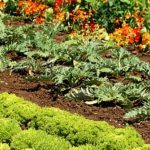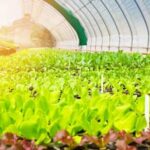Welcome to the world of gardening. As a beginner, it’s important to start with easy vegetables for beginner gardeners.
Gardening can be a rewarding and therapeutic hobby, and starting with the right vegetables can make the experience more enjoyable and successful. In this article, we will explore the benefits of gardening, how to choose the perfect location for your vegetable garden, essential tools and supplies you’ll need, a variety of easy-to-grow vegetables for beginners, planting and maintenance tips, harvesting and enjoying your produce, troubleshooting common issues, and next steps in your gardening journey.
Gardening offers numerous benefits such as improved mental health, physical activity, and access to fresh organic produce. For beginner gardeners looking to embark on this journey, choosing the right location is crucial. Factors such as sunlight, soil quality, and water access should be carefully considered when selecting a spot for your vegetable garden. Additionally, having the essential tools and supplies is necessary for starting a successful garden.
In the following sections of this article, we will provide valuable information on easy-to-grow vegetables that are perfect for beginners such as tomatoes, zucchini, lettuce, carrots, and cucumbers. We will also offer step-by-step instructions on how to plant each type of vegetable as well as tips for ongoing maintenance. So let’s dig in and get started on this exciting gardening adventure.
Benefits of Gardening
Gardening offers a wide array of benefits that extend beyond just growing fresh produce. Here are some of the many advantages of gardening for beginner gardeners:
- Mental Health: Gardening has been shown to reduce stress, anxiety, and depression. The act of tending to plants and being surrounded by nature can have a calming effect on the mind and improve overall mental well-being.
- Physical Activity: Engaging in gardening activities such as digging, planting, weeding, and watering provides a good amount of physical exercise. It’s a great way to stay active without having to hit the gym.
- Access to Fresh Produce: Growing your own vegetables ensures access to fresh, organic produce right from your backyard. This means you can enjoy delicious and healthy meals without having to rely on store-bought options.
- Environmental Benefits: Gardening contributes positively to the environment by reducing carbon footprint, promoting biodiversity, and conserving water and soil quality.
Gardening is not only an enjoyable hobby but also a rewarding lifestyle choice that enhances both physical and mental well-being while promoting sustainability. As beginner gardeners start with easy vegetables like tomatoes or lettuce, they’ll soon reap these wonderful benefits.
Choosing the Right Location
Selecting the right location for your vegetable garden is crucial to its success. When it comes to easy vegetables for beginner gardeners, choosing the best spot will make it easier for these new gardeners to grow their produce successfully.
One of the most important factors to consider when choosing a location for your vegetable garden is sunlight. Most vegetables need at least six hours of direct sunlight a day to thrive. Be sure to select an area in your yard or balcony that receives ample sunlight throughout the day.
Additionally, you’ll want to ensure that the soil in this location is suitable for growing vegetables. Conduct a soil test or simply observe whether water easily drains through your chosen spot. Water access is another significant factor; make sure you have easy access to water for regular irrigation of your plants.
Once you have found the perfect location, it’s time to prepare and plan out your gardening space. Clear any debris from the area and mark off where each vegetable will be planted. By taking these simple steps, beginner gardeners can set themselves up for success as they start their gardening journey.
| Factor | Consideration |
|---|---|
| Sunlight | Select an area with at least 6 hours of direct sunlight per day. |
| Soil Quality | Ensure proper drainage and fertility of the soil. |
| Water Access | Make sure there is easy access to water for regular irrigation. |
Essential Tools and Supplies
Tools
When starting your own vegetable garden, it’s important to have the right tools on hand to make the process as smooth as possible. Some essential tools for beginner gardeners include a trowel, garden gloves, a watering can or hose, and a hand-held rake. These tools will help you with tasks such as planting seeds, weeding, watering your plants, and maintaining the overall health of your garden.
Supplies
In addition to the necessary tools, there are also several supplies that are important for successful vegetable gardening. Good quality soil is crucial for providing the proper nutrients for your plants to thrive. Be sure to invest in some organic compost or fertilizer to enrich the soil and promote healthy growth. You will also need containers or pots if you plan on container gardening, as well as plant markers to keep track of what you’ve planted.
Seeds
Of course, you can’t have a vegetable garden without seeds. Depending on what vegetables you decide to grow, you’ll need to purchase the appropriate seeds from a local nursery or reputable online retailer. Be sure to read up about each type of seed’s specific requirements so that you can provide the best environment for them to grow successfully.
With these essential tools and supplies in hand, beginner gardeners will be well-equipped to start their own thriving vegetable gardens and enjoy the benefits of growing their own fresh produce.
Easy Vegetables for Beginner Gardeners
When starting a vegetable garden for the first time, it’s important to choose easy vegetables for beginner gardeners. These are varieties that require minimal maintenance and are more forgiving of common mistakes. By selecting the right vegetables, you can build confidence and experience early success in your gardening journey.
Tomatoes
Tomatoes are one of the most popular and easy-to-grow vegetables for beginner gardeners. They thrive in sunny locations with well-drained soil and only require regular watering and occasional fertilization. With proper care, tomatoes produce an abundant harvest throughout the growing season, making them a rewarding choice for new gardeners.
Zucchini
Zucchini is another excellent choice for beginners due to its prolific growth and resistance to pests and diseases. This versatile vegetable can be planted directly in the ground or in containers, making it suitable for gardens of all sizes. Zucchini plants also produce an abundance of fruits, providing a continuous harvest for novice gardeners to enjoy.
Lettuce
Lettuce is a quick-growing vegetable that is perfect for beginner gardeners who want to see results fast. It can be grown in both spring and fall, tolerates partial shade, and does not require much space. With regular watering and protection from extreme heat, lettuce can be easily cultivated in a home garden, allowing beginners to enjoy fresh salads straight from their own backyard.
Planting and Maintenance Tips
Now that you’ve chosen the perfect spot for your vegetable garden and gathered all the necessary tools and supplies, it’s time to get down to the fun part – planting and maintaining your easy vegetables for beginner gardeners. Here are some helpful tips to ensure that your vegetables thrive and produce a bountiful harvest:
- Prepare the soil: Before planting your vegetables, make sure the soil is well-prepared. Remove any weeds, rocks, or debris, and add compost or organic matter to improve soil fertility.
- Planting depth: When planting seeds or seedlings, be sure to follow the recommended planting depth for each type of vegetable. This information can usually be found on the seed packet or plant label.
- Watering: Proper watering is essential for healthy plant growth. Water your vegetables regularly, especially during dry periods. Avoid overwatering, as this can lead to root rot.
In addition to these general maintenance tips, each type of vegetable may have specific care requirements. Here are some additional tips for caring for specific easy vegetables for beginner gardeners:
- Tomatoes: Provide support for tomato plants with stakes or cages to keep them upright as they grow. Prune any suckers that may develop in the leaf axils.
- Zucchini: Keep an eye out for powdery mildew, a common issue with zucchini plants. Apply a fungicide if necessary and ensure good air circulation around the plants.
- Lettuce: Harvest outer leaves regularly to encourage new growth. Keep lettuce well-watered to prevent bitter-tasting leaves.
By following these planting and maintenance tips, you’ll be well on your way to growing a successful vegetable garden filled with fresh and nutritious produce. Happy gardening.
Harvesting and Enjoying the Fruits of Your Labor
After putting in the time and effort to nurture your vegetable garden, it’s finally time to enjoy the fruits of your labor. But how do you know when each vegetable is ready to be harvested? Understanding the signs of readiness for different vegetables is crucial for ensuring that you pick them at their peak freshness and flavor.
For beginner gardeners, it’s important to remember that each type of vegetable has its own indicators for harvesting. For example, tomatoes should be picked when they are fully colored and firm but give slightly under pressure.
Zucchini is best harvested when young and tender, typically around 6 to 8 inches in length. Lettuce can be cut as soon as it reaches a size suitable for eating, and carrots are usually ready once their tops reach about half an inch in diameter.
When it comes to enjoying the freshly harvested produce from your vegetable garden, the possibilities are endless. From simple salads to flavorful stir-fries, there are countless recipes that allow you to showcase the flavors of your homegrown vegetables. In addition, preserving techniques such as canning or freezing can help you enjoy your harvest long after the growing season has passed.
Ultimately, harvesting and enjoying the fruits of your labor is a rewarding experience that allows beginner gardeners to appreciate the full cycle of cultivating their own food. With a little patience and care, you can savor the flavors of your easy vegetables for beginner gardeners all year round.
Troubleshooting Common Issues
Once you have planted your easy vegetables for beginner gardeners, it’s essential to understand and prepare for potential issues that may arise during the growing process. By being proactive and prepared, you can ensure a successful and bountiful harvest. Common problems that beginner gardeners often face include pests, diseases, and poor growing conditions.
Pests such as aphids, snails, and caterpillars can wreak havoc on your vegetable garden if left unchecked. One way to address this issue is by implementing natural pest control methods such as introducing beneficial insects like ladybugs or using organic insecticidal soaps. Additionally, practicing crop rotation and maintaining good garden hygiene can help prevent pest infestations.
Diseases such as powdery mildew, blight, and root rot can also affect your vegetable plants. To combat these issues, make sure to space your plants properly to allow for adequate air circulation and avoid overwatering. It’s also important to remove any infected plants immediately to prevent the spread of disease to healthy ones.
Lastly, poor growing conditions such as nutrient deficiencies or improper watering can hinder plant growth. Regularly monitor the soil pH levels and provide adequate nutrients through fertilization as needed. Be mindful of overwatering or underwatering your plants by adjusting your watering schedule based on the specific needs of each vegetable variety.
By addressing these common issues early on in the growing process, beginner gardeners can set themselves up for a successful and rewarding gardening experience. Remember that learning from these challenges will only make you a more skilled gardener in the long run.
Conclusion and Next Steps
In conclusion, starting a vegetable garden as a beginner can be a rewarding and fulfilling experience. By choosing easy vegetables for beginner gardeners, you can set yourself up for success and enjoy the many benefits of gardening. From improved mental health to access to fresh, organic produce, there are countless reasons to start your own vegetable garden. It’s also a great way to get active and spend time outdoors, all while learning new skills.
As you embark on this journey, it’s important to remember the key factors for success, such as choosing the right location with adequate sunlight and good soil quality. Equipping yourself with essential tools and supplies will also ensure that you have everything you need to get started.
The list of easy-to-grow vegetables provided in this blog post offers a variety of options for beginners, from tomatoes and zucchini to lettuce and carrots. With step-by-step planting and maintenance tips, as well as troubleshooting advice for common issues, you’ll be well-prepared to care for your vegetable garden.
Now that you’ve learned about the benefits of gardening and have all the information you need to get started on your own vegetable garden journey, it’s time to take the next step. Don’t be afraid to get your hands dirty and embrace the learning process that comes with gardening. Whether you have a backyard or simply a sunny balcony, there are options for everyone.
So go ahead, choose your favorite easy vegetables for beginner gardeners and start growing. Happy gardening.
Frequently Asked Questions
What Vegetables Are Easiest to Grow for Beginners?
In general, some of the easiest vegetables to grow for beginners include radishes, lettuce, green beans, and cherry tomatoes. These varieties tend to be low-maintenance and forgiving, making them ideal for novice gardeners.
What Are the Best Vegetables for a First Time Garden?
For a first-time garden, it’s best to start with vegetables that are relatively easy to grow and maintain. This includes options like cucumbers, zucchini, carrots, and spinach. These vegetables are not only beginner-friendly but also produce satisfying yields.
What Should I Put in My Beginner Vegetable Garden?
As a beginner, it’s important to start with the basics in your vegetable garden. This means including essential items like good quality soil, basic gardening tools (such as a trowel and watering can), and of course, the chosen vegetable seeds or seedlings. It’s also crucial to ensure proper sunlight and water access for your garden to thrive.

If you’re looking to get into vegetable gardening, or are just looking for some tips on how to make your current garden better, then you’ve come to the right place! My name is Ethel and I have been gardening for years. In this blog, I’m going to share with you some of my best tips on how to create a successful vegetable garden.





